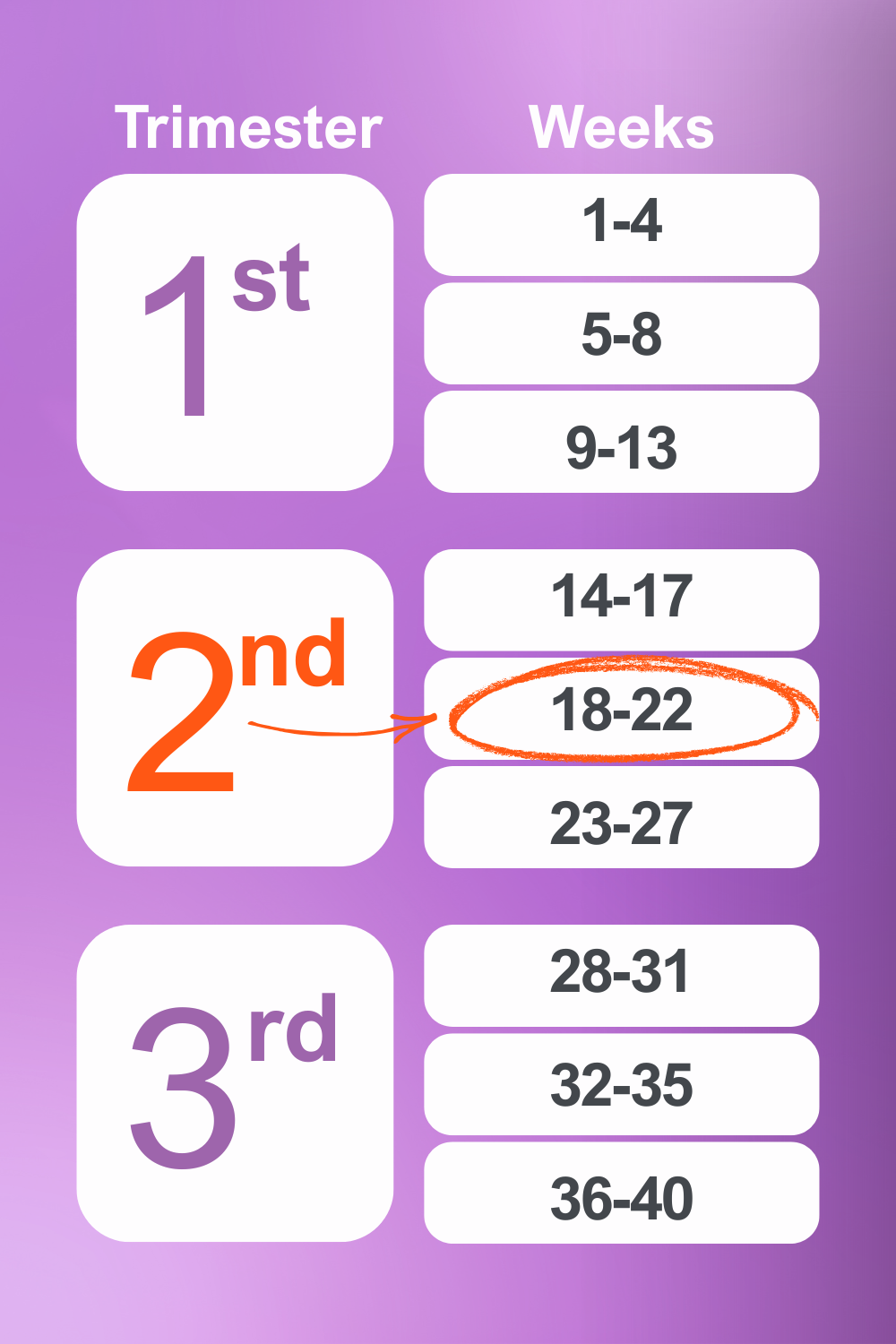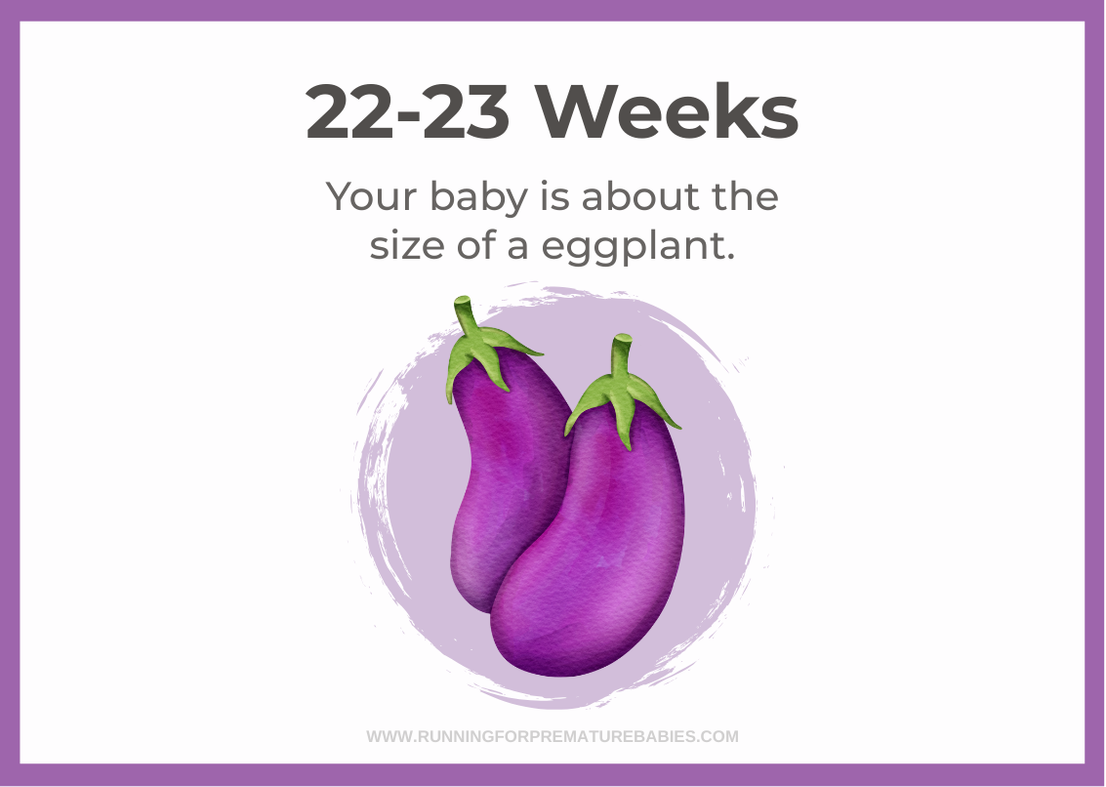Key Milestone Weeks in Pregnancy
Second Trimester

22-23 Weeks: Baby can hear sounds and is practising breathing movements.
Summary:
At 22-23 weeks pregnant, your baby is growing rapidly and becoming more active, with features like eyelashes, fingernails, and the ability to respond to sound and light. Although your baby isn’t breathing air yet, they are practising breathing movements by inhaling and exhaling amniotic fluid. This helps develop the muscles and coordination needed for breathing after birth. You may start to feel stronger movements and experience common symptoms such as bloating, backache, Braxton Hicks contractions and urinary incontinence. Regular visits to your health practitioner and focus on your general wellbeing remains important.
Your baby is about 28 cm in length and weighs approximately 400 grams. They are becoming more active, and you’ll likely feel stronger movements as their muscles develop. Their lungs are beginning to produce surfactant, a vital substance for breathing after birth, and they’re covered in fine hair (lanugo) and a protective coating (vernix). The vernix caseosa, a creamy, white protective coating, is forming on your baby’s skin, shielding it from constant exposure to amniotic fluid and helping to regulate temperature after birth.
Your baby can hear internal sounds like the mother's heartbeat and digestive noises, and is beginning to detect external sounds such as voices and music. These auditory experiences help lay the foundation for post-birth bonding and recognition. Simultaneously, your baby is practising breathing movements by rhythmically inhaling and exhaling amniotic fluid, which strengthens the respiratory muscles and prepares the lungs for life outside the womb. These milestones mark a critical phase in sensory and physiological development.
At 22-23 weeks pregnant, your body is undergoing several important changes to support your growing baby. Hormonal shifts and the physical expansion of your uterus can lead to symptoms such as round ligament pain, backache, and pelvic discomfort, which are common and manageable with physiotherapy and gentle movement. You may also experience heartburn, constipation, and varicose veins, as your digestive system slows and blood volume increases.
Tip: Pelvic floor exercises (like Kegels) can help reduce incontinence and prepare your body for labour.

Your baby is about 28 cm in length and weighs approximately 400 grams. They are becoming more active, and you’ll likely feel stronger movements as their muscles develop. Their lungs are beginning to produce surfactant, a vital substance for breathing after birth, and they’re covered in fine hair (lanugo) and a protective coating (vernix). The vernix caseosa, a creamy, white protective coating, is forming on your baby’s skin, shielding it from constant exposure to amniotic fluid and helping to regulate temperature after birth.
Your baby can hear internal sounds like the mother's heartbeat and digestive noises, and is beginning to detect external sounds such as voices and music. These auditory experiences help lay the foundation for post-birth bonding and recognition. Simultaneously, the baby is practising breathing movements by rhythmically inhaling and exhaling amniotic fluid, which strengthens the respiratory muscles and prepares the lungs for life outside the womb. These milestones mark a critical phase in sensory and physiological development.
See FAQs Below
Get Involved
Run with us
Donate
Join the Premmie Marathon Challenge
FAQs
What does it mean if my baby moves a lot at 22-23 weeks pregnant?
Around 22-23 weeks, your baby is growing rapidly and becoming more active. Movements may include kicks, rolls, and stretches. These are signs of a developing nervous system and muscle tone. At this stage you may notice daily activity cycles, and their movements may become more noticeable, especially when you're resting. Your baby may be more active at night when you're still, and quieter during the day when your movements lull them to sleep. This is completely normal and part of their developing rhythm. If you notice a significant drop in movement, or if something feels 'off'. trust your instincts and contact your healthcare provider. Some parents start informal kick counts around this time to track regular movement, which can be reassuring and helpful later in pregnancy.
At 23-23 weeks pregnant should I be taking pregnancy vitamins?
At 22-23 weeks pregnant, it is generally recommended that you continue taking pregnancy vitamins to support both your health and your baby’s development. It’s important to check with your healthcare provide first.
Key supplements include:
- Folic acid (500 micrograms daily) to help prevent neural tube defects
- Iodine (150 micrograms daily) for brain and nervous system development
- Vitamin D (400 IU daily) to support calcium absorption and bone health.
Additional supplements like iron may be needed in the second and third trimesters, especially if blood tests show low levels, and vitamin B12 is important for those following vegetarian or vegan diets. Omega-3 fatty acids are also beneficial for brain and eye development and can be obtained through diet or supplements. It’s important to only take multivitamins specifically formulated for pregnancy, as others may contain unsafe levels of certain nutrients like vitamin A. Always consult your doctor, midwife, or dietitian before starting or changing supplements.
What is a perennial massage?
A perineal massage is a technique used during late pregnancy to help stretch and prepare the perineum, the area between the vaginal opening and the anus for childbirth. Its main goal is to reduce the risk of perineal tearing and the need for an episiotomy (a surgical cut made during birth). It is generally recommended towards the end of third trimester, performing once or twice a week.
Can a baby born at 22-23 weeks survive?
A baby born at 22 weeks gestation is considered extremely premature, and while survival is possible, it is very rare and medically complex. According to the Sydney Children's Hospitals Network, most premature babies are born between 32 and 36 weeks, and those born earlier than 32 weeks often face immediate health challenges due to underdeveloped organs, especially the lungs. Babies born at 22 weeks typically require intensive support in a Neonatal Intensive Care Unit (NICU), and their chances of survival depend heavily on the availability of advanced medical care and individual health factors.
Data shows that babies born at 23 weeks spend an average of 143 days in hospital, indicating the level of care required even for those slightly further along in gestation. Babies born at 22 weeks may face even longer hospital stays and are at high risk of complications such as developmental delays, respiratory issues, and long-term disabilities.
Are there things I should avoid eating at 22-23 weeks?
At 22-23 weeks pregnant, it's important to continue to avoid certain foods that could pose a risk to you or your baby.
Dairy
- Soft cheeses (e.g. brie, camembert, blue cheese, ricotta, feta) unless cooked to at least 75°C.
- Soft-serve ice cream.
Eggs
- Raw or undercooked eggs (e.g. in homemade mayonnaise, mousse, raw cake batter).
- Eggs with dirty or cracked shells.
Fish and Seafood
- High-mercury fish: shark (flake), swordfish, marlin. Limit to 100g every 2 weeks.
- Orange roughy and catfish, no more than once a week.
- Raw or ready-to-eat seafood: sashimi, sushi, smoked salmon, pre-cooked prawns.
Meat
- Raw or undercooked meat, including rare steak and burgers.
- Cold cured meats: salami, ham, chorizo, pepperoni.
- Deli meats and cold cooked chicken.
- Liver and liver products (high in vitamin A).
Fruits and Vegetables
- Pre-packaged salads and pre-cut fruit.
- Rockmelon and raw bean sprouts.
- Unwashed produce, especially leafy greens and berries.
Other
- Hummus, tahini, and sesame-based products (risk of salmonella).
- Alcohol (no safe level during pregnancy).
- Caffeine, limit to 200 mg per day (about 1–2 cups of coffee).
- Leftovers older than 1 day or not reheated thoroughly.
At 20 weeks pregnant can I fly and travel?
Yes, you can fly at 20 weeks pregnant, but there are important considerations to keep in mind to ensure your safety and comfort. Most airlines allow pregnant women to fly up to 28 weeks, but policies vary, especially for multiple pregnancies. It’s essential to check with your airline and obtain a doctor’s letter confirming your due date and fitness to travel. The second trimester (weeks 13-27) is generally the safest time to travel, provided there are no complications. However, pregnant women should avoid long-distance travel if they have high-risk conditions such as gestational diabetes, high blood pressure, or a history of miscarriage. Always carry your maternity notes or antenatal records when flying.
Risks like deep vein thrombosis (DVT) increase during pregnancy, especially on long flights, so it's recommended to stay hydrated, move regularly, and wear compression stockings. Before flying, consult your doctor to assess your individual health and travel plans. Also, ensure your travel insurance covers pregnancy-related issues, including premature birth or cancellation due to complications.
Related reading:
First Trimester
What to expect when you're 3-4 weeks pregnant
What to expect when you're 5 weeks pregnant
What to expect when you're 6-9 weeks pregnant
What to expect when you're 10 weeks pregnant
What to expect when you're 12 weeks pregnant
What to exprect when you're 14 weeks pregnant
Second Trimester
What to expect when you're 18 weeks pregnant
What to expect when you're 20 weeks pregnant
What to expect when you're 22-23 weeks pregnant
What to expect when you're 24 weeks pregnant
What to expect when you're 26-27 weeks pregnant
Third Trimester
What to expect when you're 28 weeks pregnant
What to expect when you're 29 weeks pregnant
What to expect when you're 30 weeks pregnant
What to expect when you're 32-33 weeks pregnant
What to expect when you're 34 weeks pregnant
What to expect when you're 36 weeks pregnant
What to expect when you're 37 weeks pregnant
What to expect when you're 38-40 weeks pregnant
If you would like to run with us, either in memory of a precious baby, to celebrate new life, or simply to add purpose to your fitness journey, click here to find out how you can help give babies a better chance of survival.
Sydney Children's Hospitals Network. (n.d.). Child development: Premature babies. Kids Health Hub. https://www.schn.health.nsw.gov.au/kids-health-hub/child-development/child-development-premature-babies Retrieved 28th July 2025
Miracle Babies Foundation. (n.d.). How long in hospital. https://www.miraclebabies.org.au/content/how-long-in-hospital/gjrlfc Retrieved 28th July 2025
Pregnancy, Birth and Baby. (n.d.). Foods to avoid when pregnant. https://www.pregnancybirthbaby.org.au/foods-to-avoid-when-pregnant. Retrieved 28th July 2025


